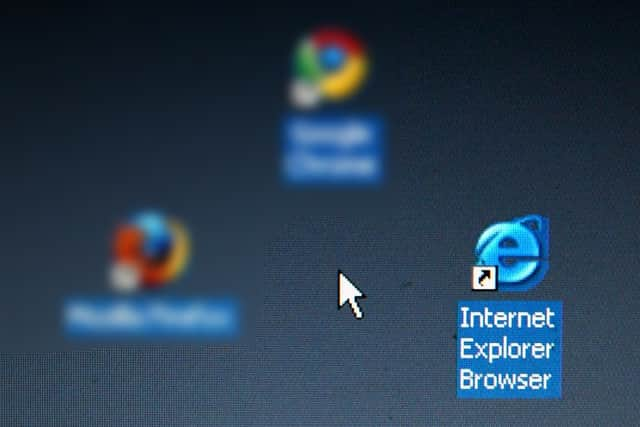When does Internet Explorer end? Microsoft browser’s end-of-life retirement - and Edge IE mode explained
and live on Freeview channel 276
Microsoft has placed the final nail in the coffin of Internet Explorer, announcing that the legacy browser will be retired permanently this week.
With the debut of the new Edge browser to coincide with the launching of Windows 10 in 2015, the tech giant began progressively moving away from the outdated software.
Advertisement
Hide AdAdvertisement
Hide AdNow, some 27 years after the first iteration of its Explorer software was launched, the web browser will be officially retired.
Here is everything you need to know about it.
What is Internet Explorer?
Beginning in 1995, Internet Explorer was a series of web browsers developed by Microsoft and included with the Microsoft Windows operating system.
For many born before Gen Z, Internet Explorer was the gateway to the internet in an era when Microsoft ruled the computing world before Google, Facebook, and TikTok, and when the browser had to be installed on computers via CD-rom.
It was once the most popular web browser, with a usage share of around 95% in 2003.
Advertisement
Hide AdAdvertisement
Hide AdBut since the release of Firefox in 2004 and Google Chrome in 2008 - faster competition which made Explorer seem sluggish in comparison - as well as the growing popularity of mobile operating systems like Android and iOS, its usage fell dramatically.
Estimates for Internet Explorer’s market share in 2022 are about 0.38% across all platforms.


What is happening?
The web browser was officially decommissioned on 15 June 2022.
Important security updates and bug fixes will no longer be rolled out as a result of Microsoft terminating its support for Explorer.
Advertisement
Hide AdAdvertisement
Hide AdEven though most people had moved on to other browsers, support for the final version of Internet Explorer 11, had been preserved.
In 2022, Microsoft began paving the way for Internet Explorer’s demise, ending support for it in the Microsoft Teams web app.
Microsoft said in a report to an Australian competition regulator’s study of the web browser market that its decision to quit Internet Explorer was largely motivated by the fact that web developers were less inclined to make their sites compatible with it.
How can I still access the internet?
Now for the technical bit. IE’s discontinuation will affect Internet Explorer 11, in particular Windows 10 client SKUs (versions 20H2 and later) as well as Windows 10 IoT (version 20H2 and later).
Advertisement
Hide AdAdvertisement
Hide AdMicrosoft Edge is the default browser on Windows 11, so users need not worry about the change.
Users should always ensure that their devices are updated to the most recent version of Windows, as the company releases security patches and fixes for the most recent vulnerabilities on a regular basis.
The desktop app will be deactivated on 15 June, and users will be transferred to Microsoft’s newer Edge browser instead.
According to research provided toTechRadar, nearly half of Windows 10 PCs will need to be upgraded because they are still using Internet Explorer as their browser, which equates to millions of computers in offices and other organisations around the world.
Advertisement
Hide AdAdvertisement
Hide AdEdge has an Internet Explorer mode that allows users to view outdated web pages that may not load correctly in contemporary browsers; Microsoft has pledged to sustain this mode until at least 2030, with a one-year warning period before it is phased out.
Microsoft has regularly warned businesses that Internet Explorer would be officially retired this year, but not all firms have yet devised a plan to migrate to a different browser; businesses that are still using Internet Explorer should choose their own retirement date, according to the company.
Some businesses that pay for Microsoft’s Long-Term Servicing Channel (LTSC) - designed for devices like medical systems that require functionality and features to remain unchanged over time - will continue to use Internet Explorer.
For those businesses, Explorer will continue to receive security updates until at least 2029.
Advertisement
Hide AdAdvertisement
Hide AdThe study also discovered that 79% of PCs aren’t even running the latest version of Windows 10, let alone Windows 11.
Despite three updates since its introduction in May 2020, the survey discovered that Windows 10 Version 2004 was the most popular build on corporate devices.
Comment Guidelines
National World encourages reader discussion on our stories. User feedback, insights and back-and-forth exchanges add a rich layer of context to reporting. Please review our Community Guidelines before commenting.
